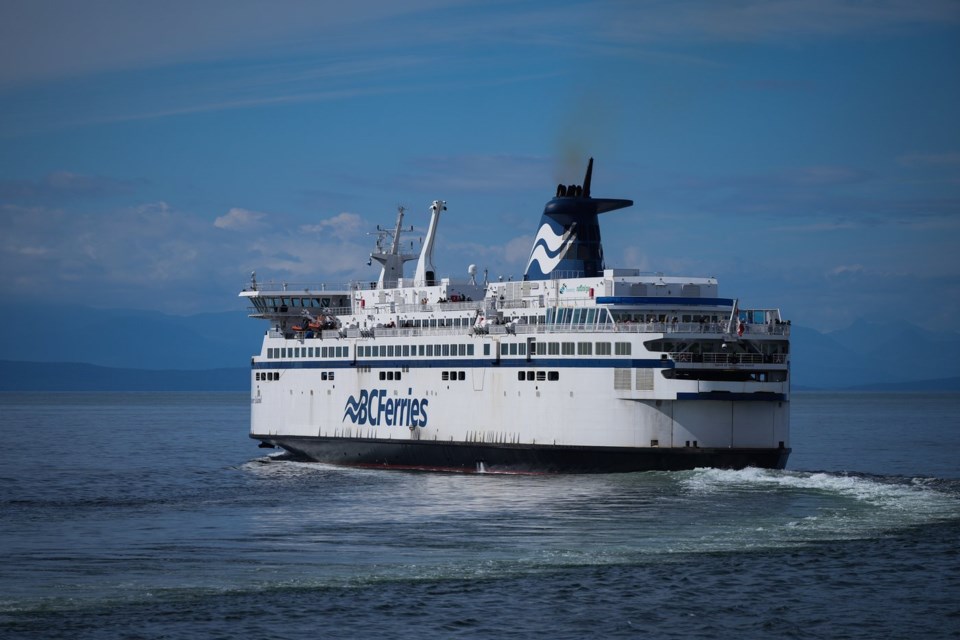VICTORIA — A business leader on ferry-dependent Vancouver Island says BC Ferries made a "strongly informed decision" in hiring a Chinese shipyard to build four new major vessels.
Both the NDP government and B.C. Conservative Opposition have criticized the choice of Chinese state-owned China Merchants Industry Weihai Shipyards to build the new ferries.
Bruce Williams, CEO of the Greater Victoria Chamber of Commerce, said the Chinese contract in the best interests of all who rely on BC Ferries, adding that BC Ferries needs more capacity to meet growing demand.
"So, this is very timely, and it's a good thing to have this happen," Williams said.
The decision is also making waves in Ottawa, where Conservative MP Jeff Kibble, whose riding neighbours Victoria, asked Transport Minister Chrystia Freeland whether Ottawa would make a $33-million federal grant to BC Ferries conditional on buying Canadian-built ships.
Freeland said she "absolutely" shared concerns about procurement at all levels, but noted that the ferry agreement was not a federal contract.
Williams said few companies around the world have the capacity to build vessels of such size, and BC Ferries did "due diligence" for years in a global procurement process that did not receive any Canadian bids.
"So, at this point, I think it's in the best interest of all the people, who rely on BC Ferries … especially up and down the coast in communities that are very reliant upon it," he said.
Williams said he would like to see a fifth vessel added to the contract to meet growing demand.
The independent BC Ferry Commission rejected a request by BC Ferries earlier this year to add a fifth major vessel to the contract, saying it is "neither essential nor affordable."
"It's too bad the fifth one hasn't been approved by the Ferry Commissioner, but it's great to see this, because the fleet is aging," Williams said.
Dan McGreer, an adjunct professor in UBC's Faculty of Applied Science, previously worked for a firm that did some of the early concept development for the new ferries, but he wasn't involved in the contract.
McGreer couldn't say why BC Ferries chose that shipyard.
"But I suspect that the advantage the Chinese shipyard had is a lower cost," he said, noting Chinese wages in the shipbuilding industry are "significantly lower" than in Canada.
"I know that BC Ferries did evaluate their capability … and I believe they were comfortable that the shipyard could build the ships," McGreer said.
McGreer said their quality from Chinese shipyards "is reasonably good," but construction needs to be "carefully" monitored.
"I think some of the European (shipyards) do have a longer experience and a higher reputation for quality, but I think the Chinese yards do deliver a product with reasonable quality."
Canadian shipbuilder Seaspan said in a statement after the request for proposals was issued last year that shipyards and their suppliers in Canada can't compete with countries that have low wages and lower safety and environmental standards.
The B.C. Conservatives have called on Premier David Eby's government to cancel the contract that was announced on Tuesday, while accusing the premier of abandoning Canadian workers.
Opposition transport critic Harman Bhangu said in a statement that the "deal is fully within the government’s control" because BC Ferries board chair Joy MacPhail is a former NDP cabinet minister.
“Premier Eby put on a big show of not stopping in China on his trade mission to Asia,” Bhangu said. “Then the NDP sends billions of dollars to a state-owned shipyard in China.”
Transportation Minister Mike Farnworth said Tuesday that he raised concern with BC Ferries about the contract, but notes that the operator is an independent company that makes its own operational decisions.
The provincial government is the sole preferred shareholder in BC Ferries and it receives public funding, and Williams said the purchase decision was not a government decision.
When asked about Farnworth's comments, Williams said his organization is "politically agnostic" in reserving comment.
"But I think that the most important thing to remember is that BC Ferries will have a team on site … in China, overseeing the project," he said.
The four new major vessels will offer 52 per cent more space for passengers and 24 per cent more space for vehicle compared to the vessels they are replacing.
The ferries will also feature diesel-battery hybrid propulsion systems that could fully run on electricity in the future, propellers that minimize underwater noise that impacts at-risk whales.
The first of the four new vessels is scheduled to enter service in the spring of 2029.
This report by The Canadian Press was first published June 11, 2025.
Wolfgang Depner, The Canadian Press



